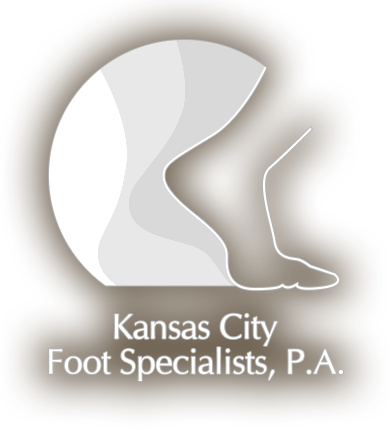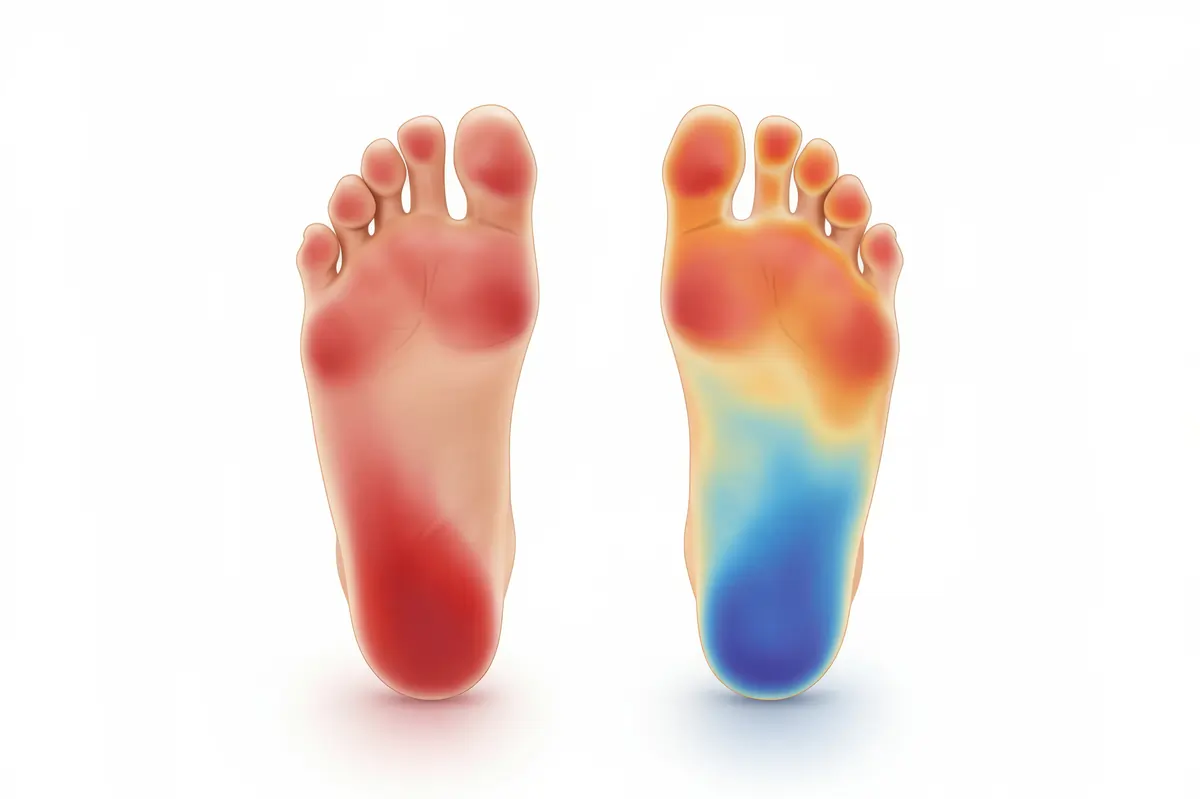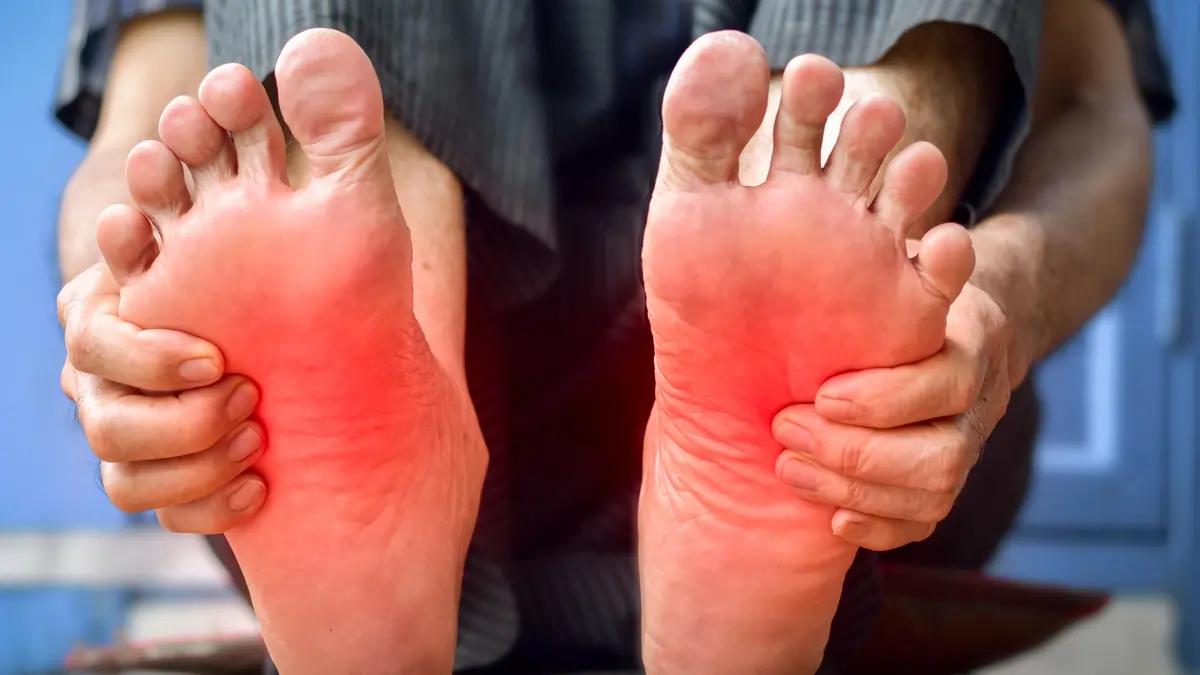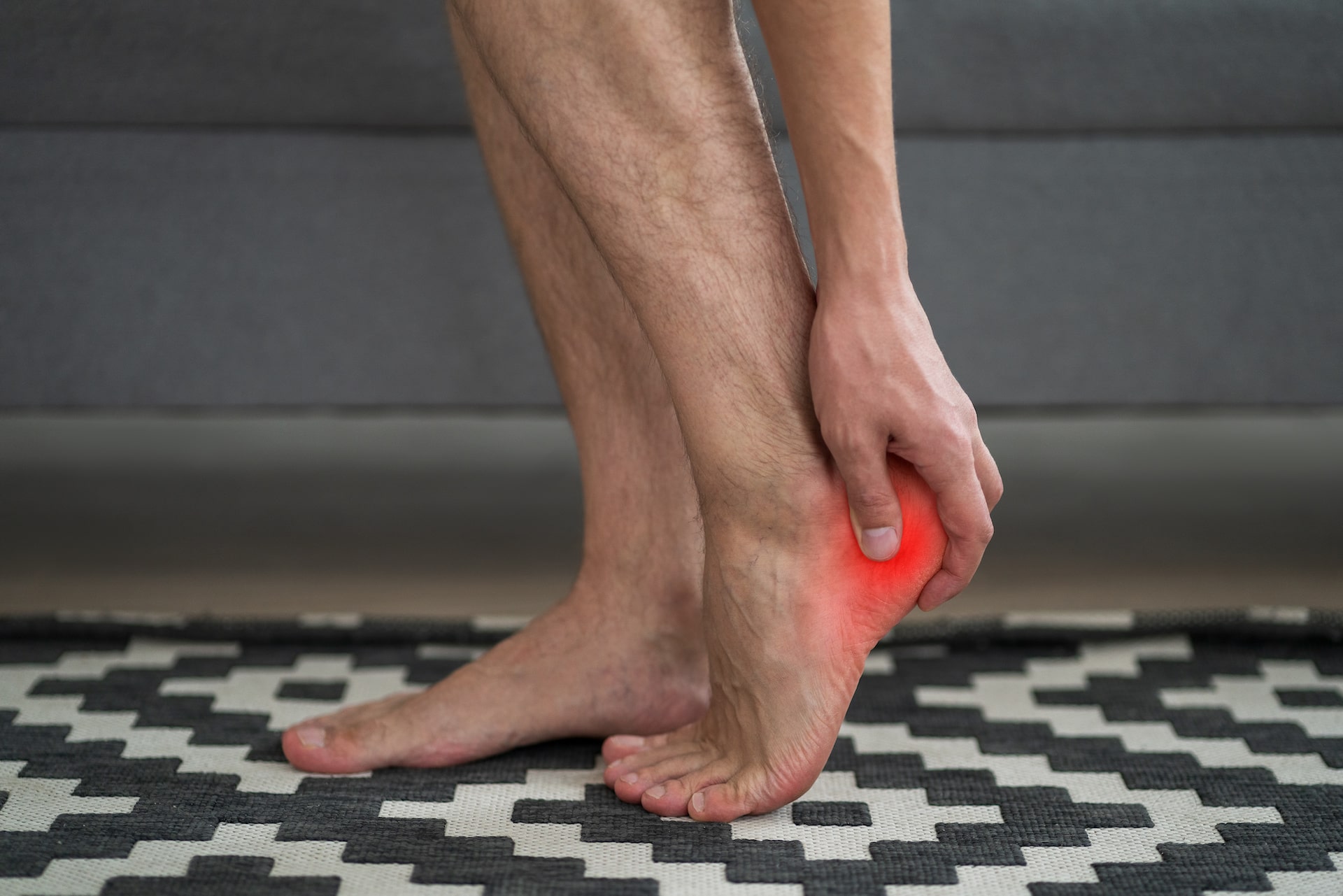
Heel pain can be frustrating, making everyday activities like walking or standing uncomfortable. At Kansas City Foot Specialists, we see patients with heel pain often. There are many different issues that can cause heel pain making it difficult to self-diagnose. There are several potential conditions that could be the culprit, each with its own causes, symptoms, and treatment options. Here’s a breakdown of the most common causes of heel pain and what you can do to feel better.
Plantar Fasciitis
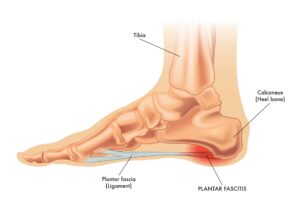 What Causes Plantar Fasciitis?
What Causes Plantar Fasciitis?
Plantar fasciitis is one of the most common causes of heel pain. It occurs when the plantar fascia—a thick band of tissue that connects your heel to your toes—becomes inflamed due to excessive stress or overuse.
Symptoms
- Sharp, stabbing pain in the bottom of the heel, especially in the morning or after long periods of rest.
- Pain that improves after a few minutes of walking but may return later in the day.
- Tenderness along the arch of the foot.
Identifying Plantar Fasciitis Pain
Plantar fasciitis pain is typically worse in the morning and improves with movement. It differs from other conditions because the pain is usually concentrated in the bottom of the heel, rather than the back or sides.
Home Remedies for Plantar Fasciitis Pain
- Stretching exercises for the plantar fascia and Achilles tendon.
- Wearing supportive shoes with arch support.
- Using ice therapy and anti-inflammatory medications.
- Avoiding high-impact activities.
When to See a Podiatrist for Plantar Fasciitis
If your heel pain persists for more than a few weeks despite home treatments, it’s time to see a podiatrist for further evaluation. Schedule with Kansas City Foot Specialists or phone a podiatrist at your earliest convenience.
Treatment Options for Plantar Fasciitis
- Custom orthotics
- Physical therapy
- Corticosteroid injections
- Minimally invasive procedures if necessary
Achilles Tendonitis
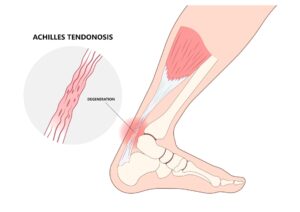 What Causes Achilles Tendonitis?
What Causes Achilles Tendonitis?
Achilles tendonitis occurs when the Achilles tendon, which connects the calf muscles to the heel, becomes inflamed due to overuse, improper footwear, or tight calf muscles.
Symptoms
- Pain and stiffness in the back of the heel, particularly in the morning.
- Swelling and tenderness along the Achilles tendon.
- Increased pain after physical activity.
Identifying Achilles Tendonitis Pain
Unlike plantar fasciitis, Achilles tendonitis causes pain in the back of the heel rather than the bottom. It also tends to worsen with movement rather than improve.
Home Remedies for Achilles Tendonitis
- Rest and avoiding high-impact activities.
- Ice therapy to reduce inflammation.
- Stretching and strengthening exercises for the Achilles tendon.
- Supportive footwear or heel lifts.
When to See a Podiatrist for Achilles Tendonitis
If your symptoms persist for more than a couple of weeks or worsen despite treatment, you should seek professional care. Schedule an appointment with Kansas City Foot Specialists or give us a call today.
Treatment Options for Achilles Tendonitis
- Physical therapy
- Custom orthotics
- Extracorporeal shockwave therapy (ESWT)
- Surgery for severe cases
Heel Spurs
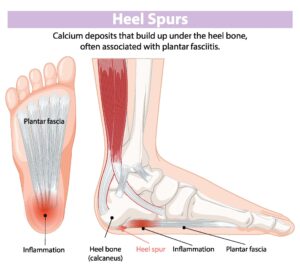 What Causes Heel Spurs?
What Causes Heel Spurs?
Heel spurs are bony growths on the underside of the heel bone, often caused by long-term strain on the foot muscles and ligaments. They are commonly associated with plantar fasciitis.
Symptoms
- Pain that feels like a sharp jab or dull ache in the heel.
- Discomfort that worsens after standing for long periods.
- Inflammation or swelling in the affected area.
Identifying Pain Caused by Heel Spurs
Heel spurs often accompany plantar fasciitis but are usually confirmed through X-rays. They can cause persistent pain even after initial inflammation subsides.
Home Treatments for Heel Spurs
- Stretching exercises
- Proper footwear with cushioning and arch support
- Ice therapy and anti-inflammatory medications
When to See a Podiatrist for Heel Spurs
If your pain persists despite trying home remedies, a podiatrist can determine whether a heel spur is the cause and provide targeted treatment. Kansas City Foot Specialists offers treatment options for minor to severe cases, schedule an appointment or call today.
Treatment Options for Heel Spurs
- Custom orthotics
- Physical therapy
- Corticosteroid injections
- Surgical removal in severe cases
Calcaneus Stress Fractures
 What Causes Calcaneus Stress Fractures?
What Causes Calcaneus Stress Fractures?
Calcaneus stress fractures occur due to repetitive impact, often in athletes or individuals who suddenly increase their activity levels.
Symptoms
- Gradual onset of pain that worsens with activity.
- Tenderness and swelling around the heel.
- Heel pain that persists even when at rest.
How to Identify Calcaneus Stress Fractures
Unlike plantar fasciitis or Achilles tendonitis, stress fractures cause pain that does not subside with movement and may worsen over time.
Home Remedies for Calcaneus Stress Fractures
- Rest and avoid weight-bearing activities.
- Ice therapy and pain management.
- Proper footwear and gradual return to activity.
When to See a Podiatrist for a Calcaneus Stress Fracture
If you suspect a calcaneus stress fracture, it’s essential to see a podiatrist immediately for diagnosis and treatment. Call Kansas City Foot Specialists or schedule online at your convenience.
Treatment Options for Calcaneus Stress Fractures
- Immobilization with a boot or cast
- Physical therapy
- Surgery in severe cases
Introducing the Surgery Center of Blue Valley
The Kansas City Foot Specialists take pride in offering specialized care for foot and ankle conditions. Dr. Laha and Dr. Hall always explore non-surgical options first, but if conservative treatments don’t provide relief, you may benefit from surgical intervention at our Surgery Center of Blue Valley. As Kansas City’s only on-site podiatry surgery center, we offer a level of expertise and convenience unmatched in the region.
Advantages of a Podiatric Boutique Surgery Center
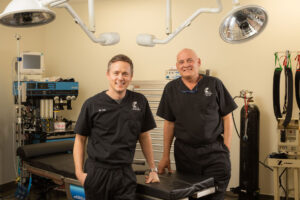 Choosing a boutique surgery center like the Surgery Center of Blue Valley comes with numerous advantages. The intimate and relaxed environment reduces anxiety often associated with medical procedures. Our podiatry surgery center is less crowded than a hospital, which not only contributes to a more pleasant experience but also minimizes the risk of infection. Because this state-of-the-art facility is dedicated solely to foot and ankle surgery, patients can expect exceptional care with our dedicated staff, who are familiar with both the equipment and the team. This familiarity enhances efficiency and ensures that you receive personalized attention throughout your visit.
Choosing a boutique surgery center like the Surgery Center of Blue Valley comes with numerous advantages. The intimate and relaxed environment reduces anxiety often associated with medical procedures. Our podiatry surgery center is less crowded than a hospital, which not only contributes to a more pleasant experience but also minimizes the risk of infection. Because this state-of-the-art facility is dedicated solely to foot and ankle surgery, patients can expect exceptional care with our dedicated staff, who are familiar with both the equipment and the team. This familiarity enhances efficiency and ensures that you receive personalized attention throughout your visit.
Experienced Podiatrists in KC
Your feet are in good hands at Kansas City Foot Specialists. From bunions to bone spurs, Dr. Laha and Dr. Hall have years of experience treating all types of foot and ankle issues. If your heel pain is persistent, worsening and affecting your daily life, it’s time to see a specialist. Schedule an appointment with your podiatric experts or give us a call today.
